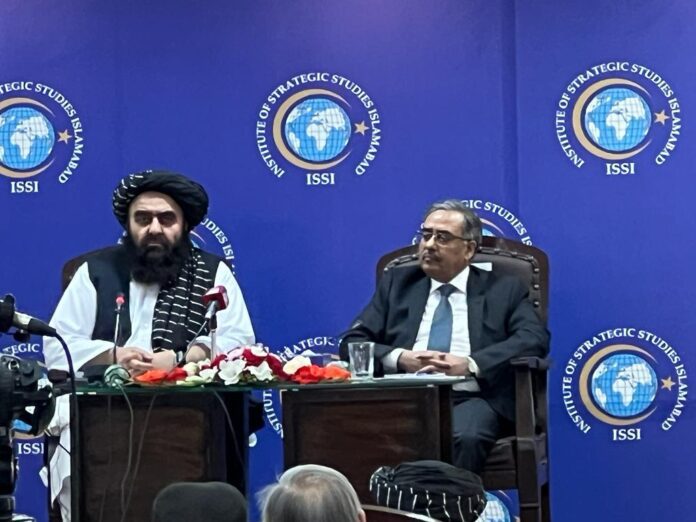Economic Connectivity and the introduction of measures regarding ease of doing business are the only ways to strengthen bilateral relations and ensure regional prosperity. These remarks were made by the acting Foreign Minister of the Islamic Emirates of Afghanistan (IEA), Malawi Amir Khan Muttaqi, at a talk conducted by the Institute of Strategic Studies Islamabad (ISSI) in Islamabad on May 8, 2023. The Foreign Minister is on his visit to Islamabad to attend the trilateral conference of foreign ministers with China and Pakistan.
Welcoming Mr. Muttaqi, Mr. Sohail Ahmed, Director General of ISSI, stated that both Pakistan and Afghanistan share several commonalities, including religion, culture, and traditions. He thanked the honorable Minister for his second official visit to Pakistan and assured that Pakistan will continue to support Afghanistan in a pragmatic way to secure the vital interests of 40 million Afghans. Highlighting Pakistan’s effort post-August 15, 2021, Mr. Sohail said that Pakistan assisted in the evacuation of the international community along with continued humanitarian support for the local population and strengthening trade and transit relations with Afghanistan. He also mentioned the significance of the OIC moot conducted last year in Islamabad on the challenges faced by Afghanistan. He assured the Foreign Minister that Pakistan will advocate for the unfreezing of Afghan assets and will lobby for reviewing the sanctions enacted by the international community on the current Afghan regime.
Muttaqi, while addressing the dignitaries, noted, “A lot has changed in Afghanistan since his previous visit to Pakistan. The IEA has forged a new foreign policy centered on multilateralism to ensure better working relationships with our neighbors and beyond. Several international countries, including China, Russia, KSA, Qatar, Turkey, etc., acknowledged these reforms, which have reopened their embassies in Kabul.”
Discussing the importance of bilateral relations between Pakistan and Afghanistan, he emphasized introducing ease-of-doing-business measures for the businesspersons of both countries. Presenting the economic statistics of his government, he claimed that the IEA has raised the exports of the country from 875 million USD to 1.9 billion USD in two years. He mentioned that bilateral trade with Pakistan has also increased from 1.1 billion USD to 2.4 billion USD, and the IEA government is expecting a bilateral trade worth 3 billion USD soon with Pakistan. By combating corruption and streamlining policies, Afghanistan became self-sufficient and presented its first budget from national earnings rather than foreign dependency, which had been the practice for the last 20 years. Afghanistan is also focusing on regional connectivity projects such as TAPI and CASA 100 and has extended our support and facilitation to the Turkmenistan-Pakistan gas pipeline project.
Highlighting the significant achievements of his government, Mr. Muttaqi stated that the IEA has added a 350,00 workforce to support the current 1 million civil servants. Furthermore, adopting the concept of an Islamic welfare nation, the Afghan government is providing stipends to 150,00 widows and 55,000 disabled people and aiming to treat and rehabilitate 4 million drug addicts across the country.
Answering questions by participants on regional security and the TTP, the Foreign Minister assured that Afghanistan will not allow any militant organization to use its land against its neighbors. Moreover, the IEA has mediated peace talks between the TTP and the Pakistani government in the past and is willing to support them in whatever capacity is required. He further said that one of the most significant outcomes of the trilateral meeting was that Pakistan, China, and Afghanistan have agreed not to provide ground or airspace to any country against each other in the future. Responding to questions regarding girls’ education, Mr. Muttaqi stated that the current regime is cognizant of the importance of girls’ education and has never declared it unIslamic. We are currently reviewing certain aspects in this regard, he added.
In the end, the honorable Foreign Minister thanked ISSI and the participants for this important session and stressed continuous support and coordination in the future for ensuring bilateral and regional prosperity and stability.




